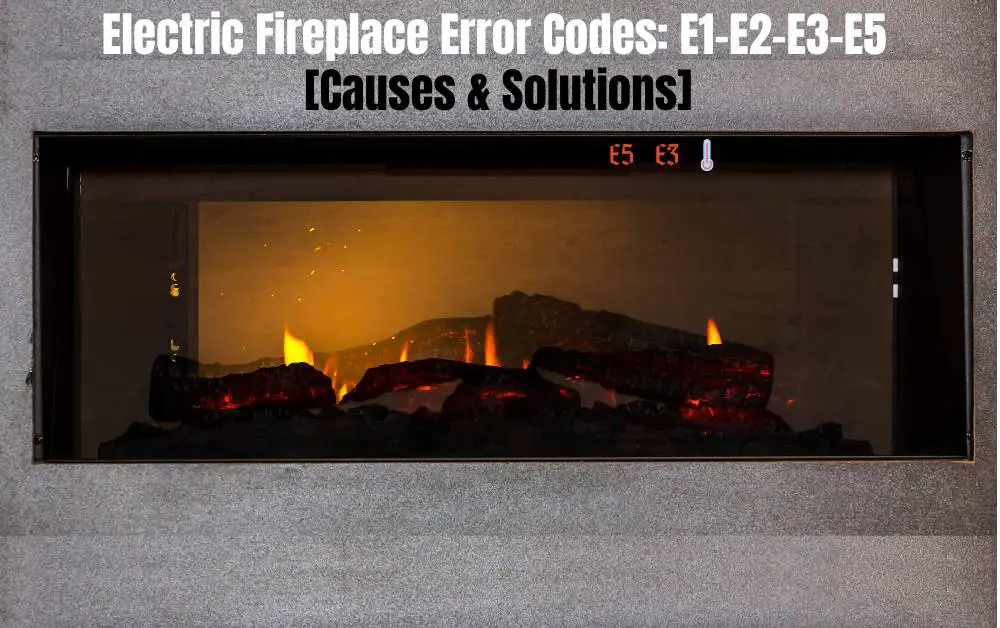Electric fireplaces are an efficient and stylish way to add warmth and ambiance to your home. Older models typically come equipped with incandescent bulbs to create the cozy glow of a real fire. However, with advances in lighting technology, many homeowners are considering upgrading to LED bulbs.
But is it possible to replace incandescent bulbs with LEDs in older electric fireplaces? Let’s explore this topic and find out how to make the switch safely and effectively.
The Role of Incandescent Bulbs in Electric Fireplaces
Incandescent bulbs are used in older electric fireplaces primarily for their warm, natural glow. These bulbs mimic the flickering light of a real flame, making them ideal for creating a realistic fire effect. Additionally, the gentle heat emitted from these bulbs can subtly enhance the overall warmth of the room.
Why Incandescent Bulbs Are Common in Older Models
Most older electric fireplace models are designed with incandescent bulbs because of their affordability and availability. When these fireplaces were first manufactured, LED technology was not as advanced or affordable, making incandescent lighting the go-to choice.
Can You Replace Incandescent Bulbs with LEDs in Older Electric Fireplaces?
Before swapping out your old bulbs, you need to consider compatibility factors. Not all LED bulbs fit into incandescent sockets, and voltage differences can affect performance. Always check your fireplace’s manual to ensure the new LEDs are compatible.
Look for LED bulbs specifically designed for electric fireplaces. These bulbs are typically rated for high temperatures and can handle the specific wattage requirements of your unit.
Some manufacturers may explicitly state whether their electric fireplaces can accommodate LED bulbs. If your manual doesn’t provide clear guidance, contacting customer support or visiting the manufacturer’s website can give you the information you need.
Limitations of Incandescent Bulbs (Energy Consumption, Heat, and Lifespan)
Despite their appealing glow, incandescent bulbs have several drawbacks. They consume more energy, generate a significant amount of heat, and have a relatively short lifespan (usually around 1,000 hours).
As a result, homeowners often find themselves replacing bulbs frequently, which can become costly and inconvenient.
Advantages of LED Bulbs Over Incandescent
- LED bulbs consume significantly less energy than incandescent ones, using up to 80% less electricity. This efficiency translates to noticeable cost savings on your energy bill, especially if you use your electric fireplace frequently.
- One of the most compelling reasons to switch to LEDs is their long lifespan. While incandescent bulbs last around 1,000 hours, LED bulbs can last up to 25,000 hours or more. This means fewer replacements and lower maintenance costs over time.
- Modern LED bulbs are available in a range of color temperatures, allowing you to choose between a warm, cozy glow or a brighter, daylight-like effect. Many LEDs also have dimming capabilities, giving you more control over the ambiance.
- LED bulbs produce far less heat compared to incandescent bulbs. This makes them safer to use, particularly in electric fireplaces where excessive heat can cause damage to the unit or pose a fire hazard.
Step-by-Step Guide to Replacing Incandescent Bulbs with LEDs
Step 1: Turn Off and Unplug the Electric Fireplace
Safety first! Always disconnect the fireplace from the power source to avoid any electrical hazards.
Step 2: Locate the Light Bulbs and Access Panel
Consult your fireplace manual to find the bulb compartment. Usually, it is located behind a small panel near the flame area.
Step 3: Remove the Old Incandescent Bulbs
Carefully unscrew the old bulbs, being mindful of any residual heat.
Step 4: Select the Appropriate LED Replacement Bulbs
Choose LED bulbs that match the socket type and voltage requirements. Opt for warm white or flame-effect LEDs for the most realistic appearance.
Step 5: Install the New LED Bulbs
Gently screw in the new bulbs, ensuring a snug but not overly tight fit.
Step 6: Test the New Lighting
Plug the fireplace back in and turn it on to check the new lighting effect. Adjust as needed to achieve the desired ambiance.
Common Challenges When Upgrading to LED Bulbs
Flickering or Inconsistent Light Output
One common issue when replacing incandescent bulbs with LEDs is flickering. This can occur if the LED bulbs are incompatible with the fireplace’s power supply or dimming system.
To avoid this, choose LED bulbs specifically designed for use in electric fireplaces. These bulbs are typically engineered to maintain consistent brightness even when used with older dimming controls.
Dimmer Compatibility Issues
If your electric fireplace features a built-in dimmer, you may find that some LED bulbs do not respond properly. Incandescent bulbs work well with traditional dimmers, but not all LEDs do.
To solve this, look for “dimmable” LED bulbs that are compatible with older dimmer switches or consider upgrading your dimmer to an LED-compatible model.
Maintaining Realistic Flame Effects
Electric fireplaces are designed to replicate the look of a natural fire. Incandescent bulbs provide a warm, flickering glow, while some LED bulbs may emit a more static or overly bright light.
To preserve the authentic look, opt for LED bulbs that mimic the soft flicker of traditional flame effects. Flame-effect LEDs are specifically designed for this purpose and can seamlessly replace incandescent bulbs without sacrificing ambiance.
Safety Tips for Installing LED Bulbs in Electric Fireplaces
Avoiding Electrical Hazards
Safety should always come first when working with electric appliances. Before replacing any bulbs, disconnect the fireplace from the power source. Double-check that the unit is completely unplugged to prevent electrical shock.
Additionally, use insulated gloves when handling light components, especially if the fireplace was recently used and the bulbs might still be hot.
Ensuring Proper Ventilation and Heat Management
LED bulbs generate less heat than incandescent ones, but proper ventilation is still essential. Make sure that the bulb housing is free from dust and debris, which could block airflow and increase the temperature.
Keep the fireplace area well-ventilated to maintain optimal performance and safety.
Checking for Loose or Damaged Wiring
After installing the LED bulbs, inspect the wiring to ensure there are no loose connections. Worn or frayed wires can cause malfunctions or pose fire risks.
If you notice any damaged wiring, consult a professional electrician to replace or repair the faulty components.
You May Also Like To Read:
- How to hide LED reflections in wall-mounted electric fireplaces?
- What are the disadvantages of an electric fireplace?
FAQs
Can any LED bulb work in an electric fireplace?
No, not all LED bulbs are suitable. You need to choose LEDs compatible with the socket type and voltage of your electric fireplace. Flame-effect LEDs are recommended for the most realistic appearance.
Will LED bulbs affect the flame effect of my fireplace?
Yes, the type of LED you choose can impact the flame effect. Opt for warm white or flame-effect LED bulbs to maintain the realistic glow typical of incandescent bulbs.
How much can I save by switching to LED bulbs?
Switching to LEDs can save up to 80% on lighting costs. Over a year, this could amount to savings of around $20 per bulb, depending on usage and energy rates.
Are there specific LED brands recommended for electric fireplaces?
Brands like Philips, Feit Electric, and GE offer high-quality LED bulbs that work well in electric fireplaces. Check the specifications to ensure compatibility.
Do LED bulbs require more maintenance than incandescent bulbs?
No, LEDs require less maintenance because they last significantly longer often up to 25,000 hours compared to the 1,000-hour lifespan of incandescent bulbs.
Affiliate Disclosure: Fireplaceadviser.com is a participant in the Amazon Services LLC Associates Program. We may earn a commission when you click on certain links on this site and purchase.

Hello!! I am Jamal Khan. I often fix my home electric heaters and gas stove problems and research the common issues in the heating units to improve my knowledge and expertise. The aim of establishing fireplaceadviser.com is to share my expertise and knowledge with my audience.












